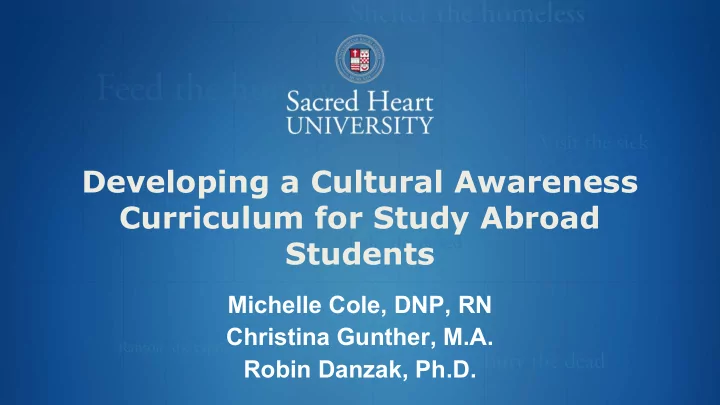

Developing a Cultural Awareness Curriculum for Study Abroad Students Michelle Cole, DNP, RN Christina Gunther, M.A. Robin Danzak, Ph.D.
“We don’t see the world the way it is. We see the world the way we are” -Anais Nin
Welcome and Intros
Impetus
Why Create a Cultural Awareness Curriculum? Students have limited intercultural experience and connectedness with global issues. Before service learning or study abroad, we must support students’ learning to: • Expand global knowledge • Anticipate and engage in complex issues • Modify behavior and resist stereotypes
Curriculum Objectives 1. Define strategies to develop students’ awareness of their own cultural understandings and practices, and how these shape their perspectives of other cultures. 2. Identify methods for observing cultural habits of the self as compared with the cultural habits of the destination country. 3. Engage students in developing cultural awareness through their participation in strategies and activities.
Student Objectives 1. Understand where you are in intercultural awareness development. 2. Understand the history and legacy of your destination country. 3. Participate in strategies and activities that help develop and expand your cultural awareness.
Part 1: Cultural Awareness Starts with the Self
Examining the cultural growth and awareness Quality improvement program evaluation Pretest-posttest design 28 students in a health care profession major of study Cultural Competence Assessment (CCA) instrument single open-ended question
Results 26-item self-reported cultural indicators on the CCA, revealing no statistical significance between the pre- and post-test score Qualitative question included in the post-test, generated a theme relating to personal and professional cultural awareness and sensitivity of the participants
Geert-Hofstede Comparison
Part 2: What Comprises Culture?
What Comprises “Culture”? • Colonial Legacy • Government/Corruption • Social Service Availability • Education • Race Relations
Why are these constructs important? Knowing historical context can help avoid offending others. • Cultural legacies are important. Helps students to navigate living/visiting in the community Expands range of thinking/understanding Develops awareness of others Relationship development
Guatemala Colonial Legacy:
Government/Corruption Understanding rule of law: President Otto Pérez Molina and Vice President Roxana Baldetti face a mounting corruption scandal. (Emisoras Unidas)
Social Services Image place holder Image place holder
Education Image Place holder Image Place holder
Race Relations Image Place holder Mayans
Race Relations Image Place holder Ladinos
Part 3: Developing Cultural Awareness through Participation
Awareness through Collaboration • (self) Tribes strategy: What’s in your wallet? • (home culture) Mini ethnography: “making the familiar strange… ” • (destination culture) Riding the bus in Guatemala (simulation -video)
Awareness through the Arts • (self) Self-portrait collage • (home culture) Photography: my community, my culture (e.g., NY Times Culture Shot) • (destination culture) Digital story (e.g., Adapting to a new culture); comics journal (e.g., http://marekbennett. com/nicaragua2014/)
Writing for Awareness • Writing about the self (e.g., identity chart/map) • Pre-travel reflections • Journaling/blogging during travel • Post-travel reflection • Action plan
Multimedia Tools • Film, Which Way Home? (watch full film online) • Ted talk, Chimamanda Ngozi Adichie: The danger of a single story • Define American • Facing History and Ourselves • Aula Intercultural
Wrap up
Recommend
More recommend